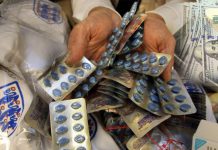A new study has found that sleep deprivation or excessive sleepiness can be linked to problems associated with blood sugar levels in people with both diabetes and prediabetes.
The researchers found that irregular sleep patterns and poor quality of sleep are associated with poor control on blood sugar levels if you are already diabetic.
The current study showed that there 73 percent of participants with prediabetes, which means they were not yet diabetic but they had elevated blood sugar levels. And the rest were recently diagnosed with type II diabetes but had been not treated yet.
The CDC warns, “Don’t let the ‘pre’ fool you – prediabetes is a serious health condition. Prediabetes puts you at increased risk of developing type 2 diabetes, heart disease, and stroke.”
The study involved 962 adults who were overweight or obese, between the ages of 20 and 65. They underwent blood tests and were asked to fill out sleep questionnaires.
The study researchers found that those who slept for less than 5 hours or more than 8 hours at night had higher levels of hemoglobin A1c (HbA1C) when compared with those who slept for 7 to 8 hours at night. The findings reflected poor control over blood sugar over the past 2 to 3 months, irrespective of being diabetic or pre-diabetic.
Lead study author Dr. Babak Mokhlesi of the University of Chicago told Reuters Health, “In the past, the general wisdom was that short sleep duration is bad for you but here we also found that maybe too long of a sleep duration is also not good for you.”
According to the American Academy of Sleep Medicine, adults should get at least 7 hours of quality sleep a night.
Please note that the new study did not prove that sleeping habits affect blood sugar levels or increase the risk of diabetes; however, it did find a correlation.
The study researchers wrote in Diabetes Care, “How sleeping for more than 8 hours a night might increase the risk of developing diabetes is not fully understood.”
Experts suspect that sleeping for longer hours could be a sign of underlying medical conditions that in turn may lead to poor glucose control.
James Gangwisch of Columbia University in New York City, who was not involved in the study, said, “The presumption is that it’s the prediabetes itself or other components of the metabolic syndrome that are pushing people to sleep longer… not that their oversleeping is increasing their risk of developing diabetes.”
Apart from HbA1C, the researchers found that sleep duration was associated with other diabetes risk factors. For instance, those who slept more than 8 hours had a higher level of fasting blood sugar and those who slept less than 6 hours and did shift work had a higher body mass index (BMI). The researchers also found that people staying up late at night and sleeping late in the morning and people with social jet lag who go to bed late and wake up late on weekends than during the week had higher blood pressure levels.























